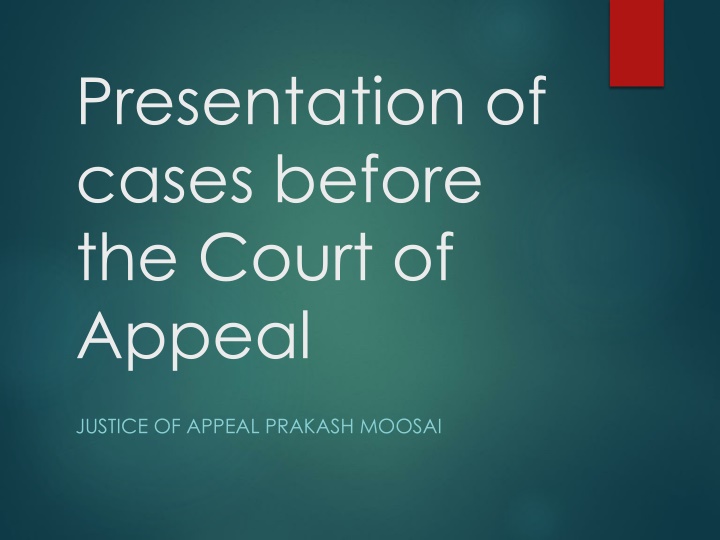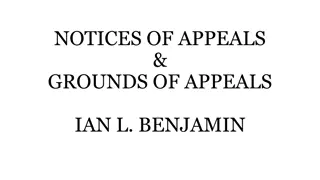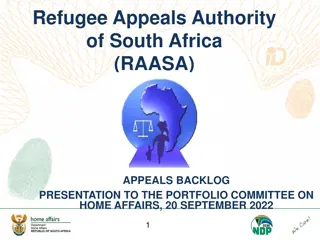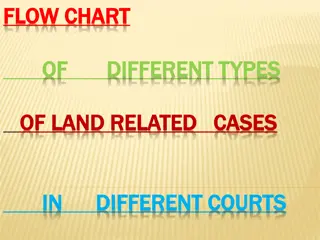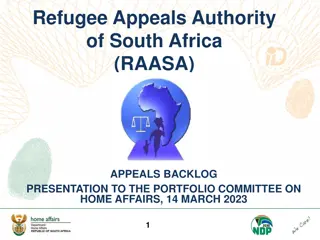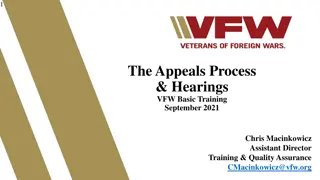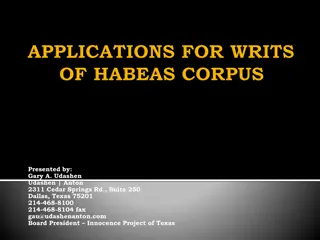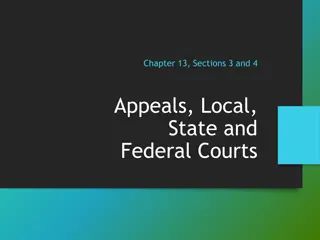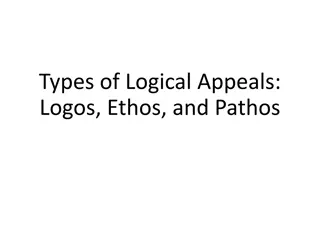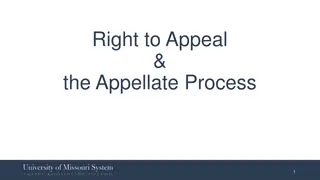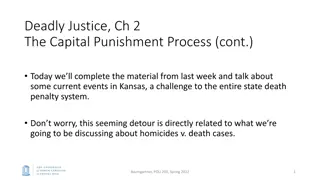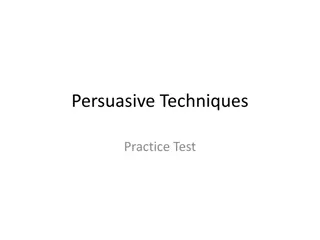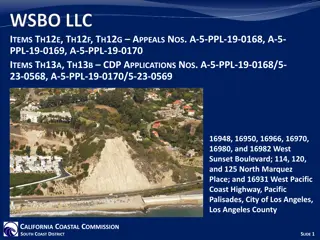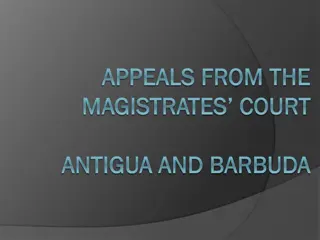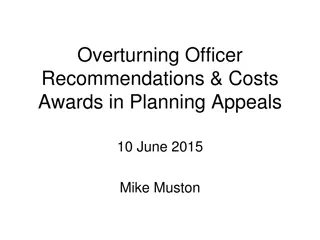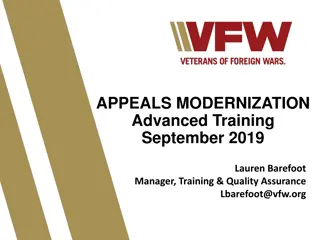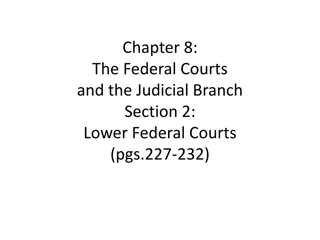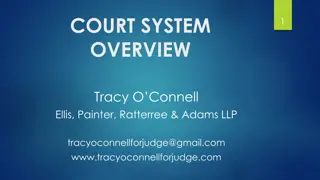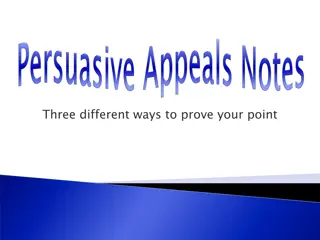Overview of Magisterial Appeals and Processes in the Court of Appeal
Presentation of cases before the Court of Appeal, focusing on Justice of Appeal Prakash Moosai. Magisterial appeals against magistrate decisions are guided by specific grounds under the Summary Courts Act. Proper procedures like giving notice of appeal and obtaining instructions are essential. The Court of Appeal has the authority to affirm, modify, or refer cases back to magistrates, among other actions. Retrials may be ordered based on factors such as offense seriousness and prosecution strength. Emphasis is placed on filing skeleton arguments to address important legal issues even in simple cases.
Download Presentation

Please find below an Image/Link to download the presentation.
The content on the website is provided AS IS for your information and personal use only. It may not be sold, licensed, or shared on other websites without obtaining consent from the author.If you encounter any issues during the download, it is possible that the publisher has removed the file from their server.
You are allowed to download the files provided on this website for personal or commercial use, subject to the condition that they are used lawfully. All files are the property of their respective owners.
The content on the website is provided AS IS for your information and personal use only. It may not be sold, licensed, or shared on other websites without obtaining consent from the author.
E N D
Presentation Transcript
Presentation of cases before the Court of Appeal JUSTICE OF APPEAL PRAKASH MOOSAI
Magisterial Appeals Appeals against decisions of a magistrate are confined to the grounds set out in Section 132 of the Summary Courts Act Chap 4:20. The most oft cited grounds are: (h) That the decision is erroneous in point of law; or (j) That the sentence imposed is unduly severe. Appeals are usually against sentence, conviction or both.
Magisterial Appeals A Notice of Appeal must be given before the expiration of the 14thday after the date of decision: Section 130 of the Summary Courts Act. Attorneys need to obtain proper instructions as to whether they are appealing against sentence, conviction or both. The Court may grant upon oral application by counsel on the day of hearing, leave to appeal against sentence.
Magisterial Appeals The Court of Appeal may, according to Section 149 of the SCA: - Affirm, modify, amend or reverse the magistrate s or justice s decision, in whole or in part; or quash the sentence passed and substitute such other sentence warranted in law (whether more or less severe); - Inter alia, refer the case back to the magistrate with relevant directions to rehear or otherwise deal with it as the court thinks just; - Make such other order for disposing of the case as justice may require.
Magisterial Appeals APPLICABLE ALSO TO APPEALS FROM THE HIGH COURT The circumstances in which the Court of Appeal will direct a retrial were enunciated in the case of Reid v R (1978) 27 WIR 245 by Lord Diplock. The Court must consider: i) The seriousness and prevalence of the offence; ii) The expense and length of time involved in a fresh hearing; iii) Does the interest of defendant to the ordeal of a new trial; iv) The length of time elapsed between the offence and the new trial if one is ordered; & v) The strength of the prosecution s case at the previous hearing. See also Section 44 (2) of the SCJA. justice justify subjecting the
Magisterial Appeals File Skeleton Arguments as far as possible as important issues of Law may be broached even in these types of Appeals. jurisprudence Appeal shows that even in the simple cases, important issues of law are being canvassed and developed. For example, using obscene language in a public place; and using annoying language to provoke a breach of jurisdiction of Estate Constables in the airport as another example. Bourgeoning from the Court of the peace; and the
Magisterial Appeals Magisterial Appeals are seldom ever adjourned, so attorneys must always come prepared to proceed. There must be exceptional circumstances to warrant an adjournment.
Magisterial Appeals Magisterial Appeal decisions are usually given right away. The Court may however reserve its decision if it is of the view that an important issue of law has been raised and necessitates the handing down of a decision in writing.
Appeals from the High Court Appeals must be filed within 14 days of the date of conviction: Section 50 of the Supreme Court of Judicature Act Chap 4:01. Time for the filing of an appeal may be extended if there is good reason. Leave to appeal is required except where the appeal is on a question of law ONLY: Section 43 SCJA.
Appeals from the High Court Therefore, to appeal against findings of fact or mixed findings of fact sentence where the sentence is not one fixed by law, leave is required: Section 43 SCJA. and law, or against
Appeals from the High Court Determination of appeals and the application of the proviso : Section 44(1) SCJA. The Court of Appeal on any such appeal against conviction shall allow the appeal if it thinks that the verdict of the jury should be set aside on the ground that it is unreasonable or cannot be supported having regard to the evidence, or that the Court before whom the appellant should be set aside on the ground of a wrong decision on any question of law or that on any ground there was a miscarriage of justice, and in any other case shall dismiss the appeal; judgment was of the convicted
Appeals from the High Court but the Court may, notwithstanding that they are of the opinion that the point raised in the appeal might be decided in favour of the appellant, dismiss the appeal if they consider that no substantial miscarriage of justice has actually occurred. See Stafford v The State [1999] 1 WLR 2026; Benjamin & Ganga v The State[2012] UKPC 8; Lundy v R [2014] 4 LRC 561; Wright v The Queen [2016] UKPC 18. The test which must be applied to the application of the proviso is whether, if the jury had been properly directed, they would inevitably have come to the same conclusion upon a review of all the evidence. per Lord Hope in Stafford v The State.
Appeals from the High Court Concerns from the Bench - The LATE filing of submissions, IF they are filed at all. - Oral submissions are sometimes overly long and convoluted. Learn to be concise. - Attorneys must not simply quote substantially from the trial judge s summation. They must ensure that what they refer to is both relevant and material.
Appeals from the High Court There is a greater need for proper analysis and application of the law. Again, do not just place large chunks of information before the court without the requisite analysis. Where persons are jointly charged, it would be helpful if submissions are compartmentalised as there is often a significant degree of overlap. Perhaps closer collaboration between attorneys in the preparation of submissions can be explored so as to avoid the otherwise repetitious nature of submissions in these types of cases. - -
Appeals from the High Court Remember, there is a duty of candour imposed upon attorneys on both sides. There is an urgent need for the implementation of Criminal Procedure Rules at the appeal level. Both the Bench and the Bar should strongly advocate for its drafting and implementation. - -
Hastening to The End In the Civil jurisdiction of the Court of Appeal, adjournments are NOT granted even in exceptional circumstances. Adjournments are only obtained in VERY exceptional circumstances. The philosophy in the Criminal jurisdiction is the same, but it is also recognised that these appeals almost always contemplate issues of an individual s liberty and depravation of same. Adjournments may therefore be necessary in fitting circumstances.
Wisdom from an Old Man FACTS MATTER! THEY REALLY DO! THEY REALLY REALLY DO! Know your facts inside out. The facts are the bedrock of your case. Magistrates and judges sometimes fail to properly assess the facts and evidence in their summations, presenting you the attorneys with additional avenues for appeal.
Wisdom from an Old Man Stick closely to the principles of the law. If properly understood and utilised, they are often wide enough to allow the savvy attorney to craft thought provoking arguments. As examples: - The interesting implications now afforded by the UKSC s restoration of the law regarding joint enterprise and the liability of secondary parties to its original moorings. See R v Jogee [2016] UKSC 8.
Wisdom from an Old Man The nuanced approach to inconsistent statements raised by the prosecution versus those raised by the defence. See Billingham [2009] 2 Cr App R 20: The Judge may also direct the jury that they may consider the [previous inconsistent statement] when deciding upon their verdict if they are sure it is true, or, in the case of a statement exculpatory of the accused, if they conclude it may be true. -
And since turnabout is fair play (do so doh like so) Concerns from the Bar Are judgments delivered in a timely fashion? Are you generally satisfied with the quality of the judgments delivered? What about a fair hearing, do you think you get a fair one when assessed in light of the fact that the judges would have already read all of your submissions? - - -
